formerly eScholarship Editions


|
|
|
|
Your request for similar items found 20 book(s). | Modify Search | Displaying 1 - 20 of 20 book(s) | |
| 1. | 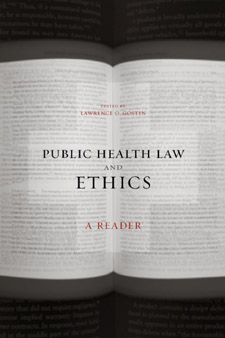 | Title: Public health law and ethics: a reader Author: Gostin, Larry O. (Larry Ogalthorpe) Published: University of California Press, 2002 Subjects: Law | Medicine | Health Care Publisher's Description: This incisive selection of government reports, scholarly articles, and court cases is designed to illuminate the ethical, legal, and political issues in the theory and practice of public health. A companion to the internationally acclaimed Public Health Law: Power, Duty, Restraint, this collection encourages debate and discourse about how courts, scholars, and policy makers respond to the salient legal and ethical dilemmas. The excerpts and commentaries in the reader analyze the legal and constitutional foundations of public health, juxtaposing them with the emerging importance of public health ethics and human rights. The book offers a systematic account of public health law, ethics, and human rights in promoting the common good. Gostin provides thoughtful commentary on the field of public health and carefully explains the meaning and importance of each selection. Scholars, legislators, and public health professionals, as well as faculty and students in schools of law, public health, medicine, nursing, government, and health administration, will benefit from the contemporary case studies covering a wide range of topics from bioterrorism to public health genetics. [brief] Similar Items |
| 2. | 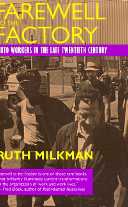 | Title: Farewell to the factory: auto workers in the late twentieth century Author: Milkman, Ruth 1954- Published: University of California Press, 1997 Subjects: Sociology | Politics Publisher's Description: This study exposes the human side of the decline of the U.S. auto industry, tracing the experiences of two key groups of General Motors workers: those who took a cash buyout and left the factory, and those who remained and felt the effects of new technology and other workplace changes. Milkman's extensive interviews and surveys of workers from the Linden, New Jersey, GM plant reveal their profound hatred for the factory regime - a longstanding discontent made worse by the decline of the auto workers' union in the 1980s. One of the leading social historians of the auto industry, Ruth Milkman moves between changes in the wider industry and those in the Linden plant, bringing both a workers' perspective and a historical perspective to the study.Milkman finds that, contrary to the assumption in much of the literature on deindustrialization, the Linden buyout-takers express no nostalgia for the high-paying manufacturing jobs they left behind. Given the chance to make a new start in the late 1980s, they were eager to leave the plant with its authoritarian, prison-like conditions, and few have any regrets about their decision five years later. Despite the fact that the factory was retooled for robotics and that the management hoped to introduce a new participatory system of industrial relations, workers who remained express much less satisfaction with their lives and jobs.Milkman is adamant about allowing the workers to speak for themselves, and their hopes, frustrations, and insights add fresh and powerful perspectives to a debate that is often carried out over the heads of those whose lives are most affected by changes in the industry. [brief] Similar Items |
| 3. |  | Title: Policies, plans, & people: foreign aid and health development Author: Justice, Judith Published: University of California Press, 1989 Subjects: Anthropology | Art and Architecture Publisher's Description: Judith Justice uses an interdisciplinary approach to show how anthropologists and planners can combine their expertise to make health care programs culturally compatible with the populations they serve. Similar Items |
| 4. | 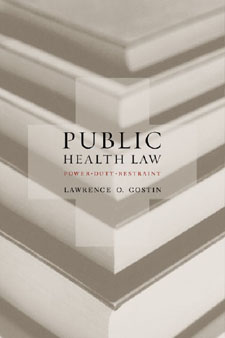 | Title: Public health law: power, duty, restraint Author: Gostin, Larry O. (Larry Ogalthorpe) Published: University of California Press, 2001 Subjects: Law | Medicine | Public Policy Publisher's Description: Gostin's timely book offers the first systematic definition and theory of public health law. Basing his definition on a broad notion of the government's inherent responsibility to advance the population's health and well-being, he develops a rich understanding of the government's fundamental powers and duties. By analyzing constitutional powers and limits, as well as statutory, administrative, and tort law, Public Health Law vividly shows how law can become a potent tool for the realization of a healthier and safer population. [brief] Similar Items |
| 5. | 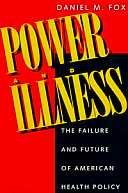 | Title: Power and illness: the failure and future of American health policy Author: Fox, Daniel M Published: University of California Press, 1993 Subjects: Sociology | Medicine | History | American Studies | United States History Publisher's Description: During most of this century, American health policy has emphasized caring for acute conditions rather than preventing and managing chronic illness - even though chronic illness has caused most sickness and death since the 1920s. In this provocative and wide-ranging book, Daniel Fox explains why this has been so and offers a forceful argument for fundamental change in national health care priorities.Fox discusses how ideas about illness and health care, as well as the power of special interest groups, have shaped the ways in which Americans have treated illness. Those who make health policy decisions have increased support for hospitals, physicians, and medical research, believing that people then would become healthier. This position, implemented at considerable cost, has not adequately taken into account the growing burden of chronic disabling illness. While decision makers may have defined chronic disease as a high priority in research, they have not given it such a priority in the financing of health services.The increasing burden of chronic illness is critical. Fox suggests ways to solve this problem without increasing the already high cost of health care - but he does not underestimate the difficulties in such a strategy. Advocating the redistribution of resources within hospital and medical services, he targets those that are redundant or marginally effective.There could be no more timely subject today than American health care. And Daniel Fox is uniquely able to address its problems. A historian of medicine, with knowledge of how hospitals and physicians behave and how health policy is made at government levels, he has extensively researched published and unpublished documents on health care. What he proposes could profoundly affect all Americans. [brief] Similar Items |
| 6. | 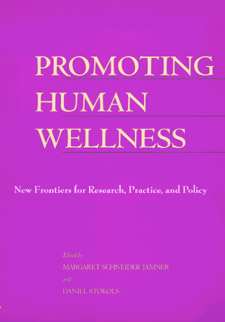 | Title: Promoting human wellness: new frontiers for research, practice, and policy Author: Jamner, Margaret Schneider Published: University of California Press, 2001 Subjects: Medicine | Public Policy | Anthropology | Aging | Education Publisher's Description: This book is a state-of-the-art educational resource on the latest research and public-policy developments in the fields of wellness promotion and disease prevention. Based on award-winning lectures by University of California faculty on nine campuses as part of the Wellness Lectures Program jointly funded by The California Wellness Foundation, Health Net, and the University of California, the volume aims to widen the scope of health care research and policy to promote wellness rather than focus on illness and disease, and to incorporate proactive, interdisciplinary approaches to health care. The volume also contains chapters by distinguished scholars inthe fields of wellness promotion and disease prevention. Many of these articles fall outside the scope of what we conventionally call health promotion, bringing new perspectives to research and policy possibilities. Promoting Human Wellness is organized around core themes such as the importance of disease prevention programs that address multiple health risks, the link between poverty and minority status and disease susceptibility, and the challenge of evaluating health benefits and cost-effectiveness. The articles discuss such timely issues as genetic determinism as a paradigm in wellness promotion, adolescent health promotion and teen pregnancy prevention strategies, racial differences in cancer epidemiology, the California smokers' helpline, strategies for reducing youth violence, HIV/AIDS prevention, domestic violence education and prevention srategies, and the future of women's health research. Presented within the framework of social ecology, several of the chapters in this volume address new ideas and approaches in the wellness field that are only now beginning to be understood such as the social construction of variables including race, class, and gender. Promoting Human Wellness will be essential reading for health practitioners, policymakers, and others seeking to expand the ways we define and achieve health. Keywords: Public health, community health, medicine, nursing, social welfare, health education, health psychology, social ecology, public policy, aging, health promotion. [brief] Similar Items |
| 7. |  | Title: Lives at risk: public health in nineteenth-century Egypt Author: Kuhnke, LaVerne Published: University of California Press, 1990 Subjects: Anthropology | Medical Anthropology Publisher's Description: Lives at Risk describes the introduction of Western medicine into Egypt. The two major innovations undertaken by Muhammad Ali in the mid-nineteenth century were a Western-style school of medicine and an international Quarantine Board. The ways in which these institutions succeeded and failed will greatly interest historians of medicine and of modern Egypt. And because the author relates her narrative to twentieth-century health issues in developing countries, Lives at Risk will also interest medical and social anthropologists.The presence of the quarantine establishment and the medical school in Egypt resulted in a rudimentary public health service. Paramedical personnel were trained to provide primary health care for the peasant population. A vaccination program effectively freed the nation from smallpox. But the disease-oriented, individual-care practice of medicine derived from the urban hospital model of industrializing Europe was totally incompatible with the health care requirements of a largely rural, agrarian population. [brief] Similar Items |
| 8. | 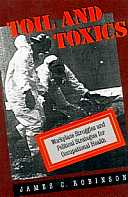 | Title: Toil and toxics: workplace struggles and political strategies for occupational health Author: Robinson, James C. (James Claude) 1953- Published: University of California Press, 1991 Subjects: Environmental Studies | Labor Studies | Sociology | Public Policy | Economics and Business Similar Items |
| 9. |  | Title: State capitalism and working-class radicalism in the French aircraft industry Author: Chapman, Herrick Published: University of California Press, 1990 Subjects: History | European History | Politics | Technology and Society | French Studies Publisher's Description: In the 1950s and 1960s France experienced an economic miracle. As the state's role expanded with efforts to create a more modern economy, however, labor relations remained more volatile and workers more radical than elsewhere in western Europe. Herrick Chapman argues in this important new book that state capitalism and working-class radicalism went hand-in-hand and that both have antecedents in the tumultuous events of the 1930s and 1940s.The author focuses on a key industry - aviation - which held center stage in France from the Great Depression to the Cold War. While manufacturers and state officials struggled to modernize, the aviation industry became a bastion of the Communist Party and an arena of combat where workers, employers, and officials promoted competing visions of industrial reform. This gave rise to a new environment where state intervention and working-class radicalism became mutually reinforcing, and by the postwar era a peculiarly contentious form of industrial politics had become firmly entrenched.Using local and national archives, the author analyzes not only how an industry transformed but also how people reacted to the Popular Front, the defeat of 1940, the Nazi Occupation, and the onset of the Cold War. He also sheds light on such central themes in modern French history as the style of entrepreneurship, the sources of state interventionism, the response of workers to technological change and the nature of the Communist movement. [brief] Similar Items |
| 10. | 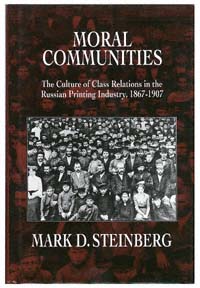 | Title: Moral communities: the culture of class relations in the Russian printing industry, 1867-1907 Author: Steinberg, Mark Published: University of California Press, 1992 Subjects: History | European History | Russian and Eastern European Studies Publisher's Description: This valuable study offers a rare perspective on the social and political crisis in late Imperial Russia. Mark D. Steinberg focuses on employers, supervisors, and workers in the printing industry as it evolved from a state-dependent handicraft to a capitalist industry. He explores class relations and the values, norms, and perceptions with which they were made meaningful. Using archival and printed sources, Steinberg examines economic changes, workplace relations, professional organizations, unions, strikes, and political activism, as well as shop customs, trade festivals, and everyday life. In rich detail he describes efforts to build a community of masters and men united by shared interests and moral norms. The collapse of this ideal in the face of growing class conflict is also explored, giving a full view of an important moment in Russian history. [brief] Similar Items |
| 11. | 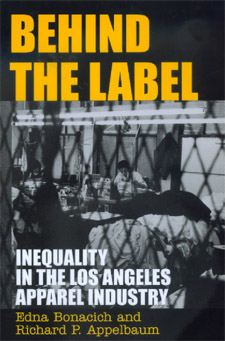 | Title: Behind the label: inequality in the Los Angeles apparel industry Author: Bonacich, Edna Published: University of California Press, 2000 Subjects: Sociology | Social Problems | California and the West | Labor Studies | Economics and Business | Urban Studies | American Studies | Ethnic Studies Publisher's Description: In a study crucial to our understanding of American social inequality, Edna Bonacich and Richard Appelbaum investigate the return of sweatshops to the apparel industry, especially in Los Angeles. The "new" sweatshops, they say, need to be understood in terms of the decline in the American welfare state and its strong unions and the rise in global and flexible production. Apparel manufacturers now have the incentive to move production to wherever low-wage labor can be found, while maintaining arm's-length contractual relations that protect them from responsibility. The flight of the industry has led to a huge rise in apparel imports to the United States and to a decline in employment. Los Angeles, however, remains a puzzling exception in that its industry employment has continued to grow, to the point where L.A. is the largest center of apparel production in the nation. Not only the availability of low-wage immigrant (often undocumented) workers but also the focus on moderately priced, fashion-sensitive women's wear makes this possible. Behind the Label examines the players in the L.A. apparel industry, including manufacturers, retailers, contractors, and workers, evaluating the maldistribution of wealth and power. The authors explore government and union efforts to eradicate sweatshops while limiting the flight to Mexico and elsewhere, and they conclude with a description of the growing antisweatshop movement. Los Angeles Times Best Nonfiction Book of 2000 [brief] Similar Items |
| 12. |  | Title: Drug war politics: the price of denial Author: Bertram, Eva Published: University of California Press, 1996 Subjects: Politics | Public Policy | Law | Sociology | Medicine | American Studies Publisher's Description: Why have our drug wars failed and how might we turn things around? Ask the authors of this hardhitting exposè of U.S. efforts to fight drug trafficking and abuse. In a bold analysis of a century's worth of policy failure, Drug War Politics turns on its head many familiar bromides about drug politics. It demonstrates how, instead of learning from our failures, we duplicate and reinforce them in the same flawed policies. The authors examine the "politics of denial" that has led to this catastrophic predicament and propose a basis for a realistic and desperately needed solution.Domestic and foreign drug wars have consistently fallen short because they are based on a flawed model of force and punishment, the authors show. The failure of these misguided solutions has led to harsher get-tough policies, debilitating cycles of more force and punishment, and a drug problem that continues to escalate. On the foreign policy front, billions of dollars have been wasted, corruption has mushroomed, and human rights undermined in Latin America and across the globe. Yet cheap drugs still flow abundantly across our borders. At home, more money than ever is spent on law enforcement, and an unprecedented number of people - disproportionately minorities - are incarcerated. But drug abuse and addiction persist.The authors outline the political struggles that help create and sustain the current punitive approach. They probe the workings of Washington politics, demonstrating how presidential and congressional "out-toughing" tactics create a logic of escalation while the criticisms and alternatives of reformers are sidelined or silenced. Critical of both the punitive model and the legalization approach, Drug War Politics calls for a bold new public health approach, one that frames the drug problem as a public health - not a criminal - concern. The authors argue that only by situating drug issues in the context of our fundamental institutions - the family, neighborhoods, and schools - can we hope to provide viable treatment, prevention, and law enforcement. In its comprehensive investigation of our long, futile battle with drugs and its original argument for fundamental change, this book is essential for every concerned citizen. [brief] Similar Items |
| 13. | 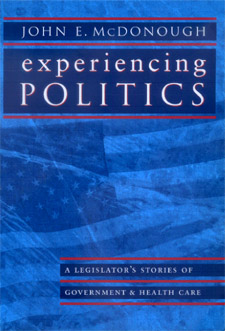 | Title: Experiencing politics: a legislator's stories of government and health care Author: McDonough, John E. (John Edward) Published: University of California Press, 2000 Subjects: Politics | Public Policy | Medicine Publisher's Description: John E. McDonough affords a rare glimpse into the practice of state politics in this insider's account of the fascinating interface between political science and real-life politics. A member of the Massachusetts House of Representatives for thirteen years and a skilled storyteller, McDonough eloquently weaves together stories of politics and policy with engaging theoretical models in a way that illuminates both the theory and the practice. By providing a link between scholarship and the world of experience, he communicates much about the essence of representative democracy. In the process, he demonstrates how politics extend beyond the public sphere into many aspects of life involving diverse values and interests. McDonough describes the nature of conflict, the role of interests, agenda setting, the nature and pace of change, the use of language, and more. Accessible, insightful, and original, his stories touch on a broad range of issues - including health care politics, campaigns, and elections; a street gang called the X-men; the death penalty; campaign finance reform, and tenants versus landlords. To the author, politics is everywhere and political dynamics are universal. While the setting for this book is one legislature, the lessons and insights are intended for everyone. [brief] Similar Items |
| 14. | 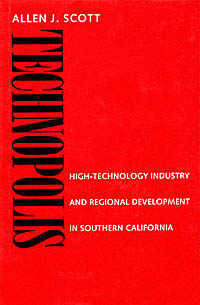 | Title: Technopolis: high-technology industry and regional development in southern California Author: Scott, Allen John Published: University of California Press, 1994 Subjects: Urban Studies | Geography | Politics Publisher's Description: Technopolis is a timely theoretical and empirical investigation of the world's largest high-technology industrial complex - Southern California. Allen Scott provides a new conceptual framework for understanding urban and regional growth processes based on a combination of inter-industrial, labor market, and geographical factors. He presents case studies and original data on three major industries that have become synonymous with Southern California: aircraft and parts, missiles and space equipment, and electronics. The business community will be particularly interested in Scott's diagnosis of post-Cold War economic ills and his suggestions for possible remedies.In good times or bad, knowledge of how Southern California's high-tech industry and regional development have interacted in the past and might interact in the future will be invaluable for regional and economic planners everywhere. [brief] Similar Items |
| 15. | 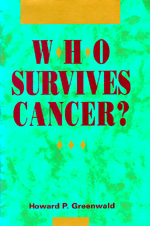 | Title: Who survives cancer? Author: Greenwald, Howard P Published: University of California Press, 1992 Subjects: Sociology | Environmental Studies | Medicine Publisher's Description: FACT OR FICTION? *A white male earning over $35,000 a year has a better chance of surviving most types of cancer than an unemployed African-American male.*Psychological factors predispose people to contracting cancer and improved emotional health promotes recovery.*Early detection is useless in curing cancer.*Experimental, not conventional, treatments offer the most benefits and longer survival rates to cancer patients.*A scientific breakthrough of practical and immediate significance in cancer treatment is imminent.*Cancer prevention is ineffective in many areas and campaigns will probably never achieve a reduction of cancer mortality approaching 50 percent.*Health Maintenance Organizations (HMOs) increase survival chances for most cancer patients.Howard Greenwald takes an incisive new look at how class, race, sex, psychological state, type of health care and available treatments affect one's chance of surviving cancer. Drawing on an original ten-year survival study of cancer patients, he synthesizes medical, epidemiological, and psychosocial research in a uniquely interdisciplinary and eye-opening approach to the question of who survives cancer and why.Scientists, health care professionals, philanthropists, government agencies, and ordinary people all agree that significant resources must be allocated to fight this dreaded disease. But what is the most effective way to do it? Greenwald argues that our priorities have been misplaced and calls for a fundamental rethinking of the way the American medical establishment deals with the disease. He asserts that the emphasis on prevention and experimental therapy has only limited value, whereas the availability of conventional medical care is very important in influencing cancer survival. Class and race become strikingly significant in predicting who has access to health care and can therefore obtain medical treatment in a timely, effective manner. Greenwald counters the popular notion that personality and psychological factors strongly affect survival, and he underscores the importance of early detection. His research shows that Health Maintenance Organizations, while sometimes prone to delays, offer low-income patients a better chance of ultimate survival. Greenwald pleads for immediate attention to the inadequacies and inequalities in our health care delivery system that deter patients from seeking regular medical care.Instead of focusing on research and the hope for a breakthrough cure, Greenwald urges renewed emphasis on ensuring available health care to all Americans. In its challenge to the thrust of much biomedical research and its critique of contemporary American health care, as well as in its fresh and often counterintuitive look at cancer survival, Who Survives Cancer? is invaluable for policymakers, health care professionals, and anyone who has survived or been touched by cancer. [brief] Similar Items |
| 16. | 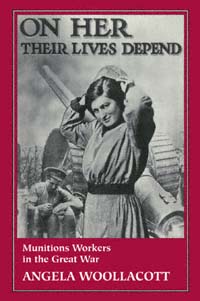 | Title: On her their lives depend: munitions workers in the Great War Author: Woollacott, Angela 1955- Published: University of California Press, 1994 Subjects: History | European History | Women's Studies Publisher's Description: In this evocative book, Angela Woollacott analyzes oral histories, workers' writings, newspapers, official reports, and factory song lyrics to present an intimate view of women munitions workers in Britain during World War I.Munitions work offered working-class women - for the first time - independence, a reliable income, even an improved standard of living. But male employers and trade unionists brought them face-to-face with their subordination as women within their own class, while experiences with middle-class women co-workers and police reminded them of their status as working class.Woollacott sees the woman munitions worker as a powerful symbol of modernity who challenged the gender order through her patriotic work and challenged class differences through her increased spending power, mobility, and changing social behavior. [brief] Similar Items |
| 17. | 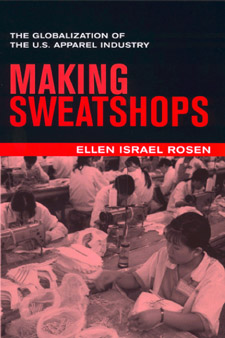 | Title: Making sweatshops: the globalization of the U.S. apparel industry Author: Rosen, Ellen Israel Published: University of California Press, 2002 Subjects: American Studies | Sociology | Anthropology | Politics | Labor Studies Publisher's Description: The only comprehensive historical analysis of the globalization of the U.S. apparel industry, this book focuses on the reemergence of sweatshops in the United States and the growth of new ones abroad. Ellen Israel Rosen, who has spent more than a decade investigating the problems of America's domestic apparel workers, now probes the shifts in trade policy and global economics that have spawned momentous changes in the international apparel and textile trade. Making Sweatshops asks whether the process of globalization can be promoted in ways that blend industrialization and economic development in both poor and rich countries with concerns for social and economic justice - especially for the women who toil in the industry's low-wage sites around the world. Rosen looks closely at the role trade policy has played in globalization in this industry. She traces the history of current policies toward the textile and apparel trade to cold war politics and the reconstruction of the Pacific Rim economies after World War II. Her narrative takes us through the rise of protectionism and the subsequent dismantling of trade protection during the Reagan era to the passage of NAFTA and the continued push for trade accords through the WTO. Going beyond purely economic factors, this valuable study elaborates the full historical and political context in which the globalization of textiles and apparel has taken place. Rosen takes a critical look at the promises of prosperity, both in the U.S. and in developing countries, made by advocates for the global expansion of these industries. She offers evidence to suggest that this process may inevitably create new and more extreme forms of poverty. [brief] Similar Items |
| 18. | 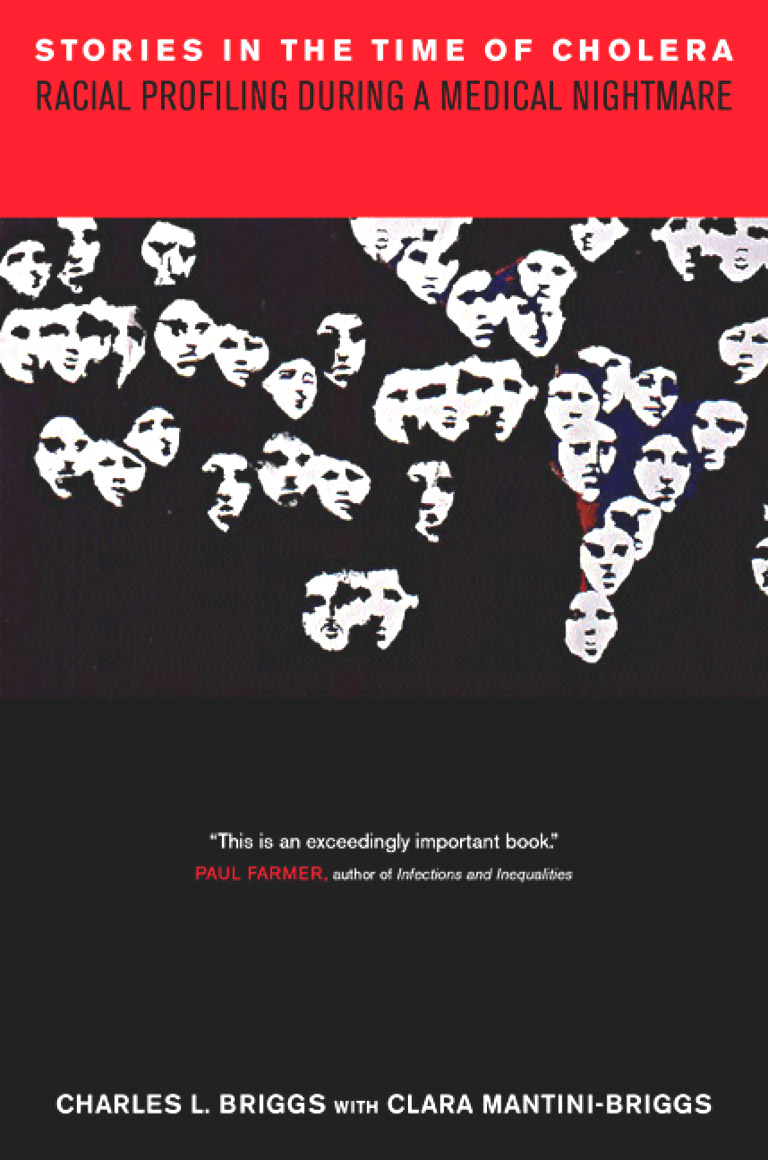 | Title: Stories in the time of cholera: racial profiling during a medical nightmare Author: Briggs, Charles L 1953- Published: University of California Press, 2003 Subjects: Anthropology | Latin American Studies | Ethnic Studies | Disease | Medical Anthropology Publisher's Description: Cholera, although it can kill an adult through dehydration in half a day, is easily treated. Yet in 1992-93, some five hundred people died from cholera in the Orinoco Delta of eastern Venezuela. In some communities, a third of the adults died in a single night, as anthropologist Charles Briggs and Clara Mantini-Briggs, a Venezuelan public health physician, reveal in their frontline report. Why, they ask in this moving and thought-provoking account, did so many die near the end of the twentieth century from a bacterial infection associated with the premodern past? It was evident that the number of deaths resulted not only from inadequacies in medical services but also from the failure of public health officials to inform residents that cholera was likely to arrive. Less evident were the ways that scientists, officials, and politicians connected representations of infectious diseases with images of social inequality. In Venezuela, cholera was racialized as officials used anthropological notions of "culture" in deflecting blame away from their institutions and onto the victims themselves. The disease, the space of the Orinoco Delta, and the "indigenous ethnic group" who suffered cholera all came to seem somehow synonymous. One of the major threats to people's health worldwide is this deadly cycle of passing the blame. Carefully documenting how stigma, stories, and statistics circulate across borders, this first-rate ethnography demonstrates that the process undermines all the efforts of physicians and public health officials and at the same time contributes catastrophically to epidemics not only of cholera but also of tuberculosis, malaria, AIDS, and other killers. The authors have harnessed their own outrage over what took place during the epidemic and its aftermath in order to make clear the political and human stakes involved in the circulation of narratives, resources, and germs. [brief] Similar Items |
| 19. | 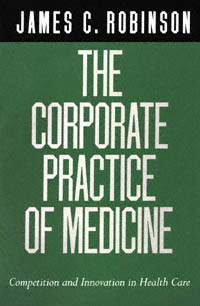 | Title: The corporate practice of medicine: competition and innovation in health care Author: Robinson, James C 1953- Published: University of California Press, 1999 Subjects: Politics | Public Policy | Medicine | Economics and Business Publisher's Description: One of the country's leading health economists presents a provocative analysis of the transformation of American medicine from a system of professional dominance to an industry under corporate control. James Robinson examines the economic and political forces that have eroded the traditional medical system of solo practice and fee-for-service insurance, hindered governmental regulation, and invited the market competition and organizational innovations that now are under way. The trend toward health care corporatization is irreversible, he says, and it parallels analogous trends toward privatization in the world economy.The physician is the key figure in health care, and how physicians are organized is central to the health care system, says Robinson. He focuses on four forms of physician organization to illustrate how external pressures have led to health care innovations: multispecialty medical groups, Independent Practice Associations (IPAs), physician practice management firms, and physician-hospital organizations. These physician organizations have evolved in the past two decades by adopting from the larger corporate sector similar forms of ownership, governance, finance, compensation, and marketing.In applying economic principles to the maelstrom of health care, Robinson highlights the similarities between competition and consolidation in medicine and in other sectors of the economy. He points to hidden costs in fee-for-service medicine - overtreatment, rampant inflation, uncritical professional dominance regarding treatment decisions - factors often overlooked when newer organizational models are criticized.Not everyone will share Robinson's appreciation for market competition and corporate organization in American health care, but he challenges those who would return to the inefficient and inequitable era of medicine from which we've just emerged. Forcefully written and thoroughly documented, The Corporate Practice of Medicine presents a thoughtful - and optimistic - view of a future health care system, one in which physician entrepreneurship is a dynamic component. [brief] Similar Items |
| 20. |  | Title: The cigarette papers Author: Glantz, Stanton A Published: University of California Press, 1998 Subjects: Politics | Medicine | Public Policy | Law | United States History Publisher's Description: Around-the-clock tobacco talks, multibillion-dollar lawsuits against the major cigarette companies, and legislative wrangling over how much to tax a pack of cigarettes - these are some of the most recent episodes in the war against the tobacco companies. The Cigarette Papers shows what started it all: revelations that tobacco companies had long known the grave dangers of smoking, and did nothing about it.In May 1994 a box containing 4,000 pages of internal tobacco industry documents arrived at the office of Professor Stanton Glantz at the University of California, San Francisco. The anonymous source of these "cigarette papers" was identified only as "Mr. Butts." These documents provide a shocking inside account of the activities of one tobacco company, Brown & Williamson, over more than thirty years. Quoting extensively from the documents themselves and analyzing what they reveal, The Cigarette Papers shows what the tobacco companies have known and galvanizes us to take action. [brief] Similar Items |